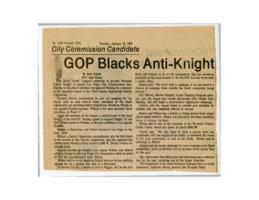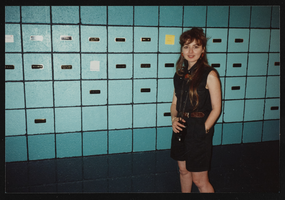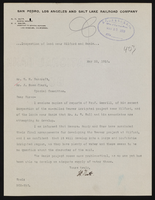Search the Special Collections and Archives Portal
Search Results

Ron Current interview, March 16, 2012: transcript
Date
Archival Collection
Description
Ron Current's heart was always in the right place, with respect to social activism and his dedication to empowering the black community in Las Vegas. Inspired by Black Panther Party founders, Huey P. Newton and Bobby Seale, Ron started the Black Panther Party Las Vegas Chapter. He was also the director of public relations for the National Alliance Against Racist and Political Repression; an organization created to work in tandem with the National Association for the Advancement of Colored People, NAACP, to eliminate racial inequality. Ron describes the overall atmosphere of the Westside community in Las Vegas during the early days, as chaotic, drug infested, and riddled with daily gang related shootings. He also recalls the historic preservation attempts made by leading members of the Westside community, such as Sarann Knight Preddy. Ron recalls working at the University Medical Center while recruiting for the Black Panther Party Las Vegas Chapter. This interview demonstrates the power of love. As the founder and leader of the Black Panther Party Las Vegas Chapter, Ron was named one of the most influential blacks in Las Vegas by the Sentinel Voice. He recalls utilizing his hands-on leadership approach towards capacity building and the successful implementation of community mobilization strategies and methods. He was a champion for educational equity, equal access to employment opportunities, and economic equality in Las Vegas, Nevada.
Text

Transcript of interview with Dedee (DaVeen) Nave by Claytee D. White, June 8, 2015
Date
Archival Collection
Description
Dedee (DaVeen) Nave reveals a life filled with distinguished results in the cultural evolution of Las Vegas since her move to the valley in 1971. She was a young bride and soon a mother when she arrived with her can-do energies. She was a trained educator who was eagerly looked outside the classroom for a way to make a difference in the community when she took a position with the Camp Fire Girls Over the following decades, the impact of involving Dedee in many valued projects is evident. In this interview, she provides a glimpse into her various aptitudes and the many people she has worked with to great results. Dedee Nave was born DaVeen Maurer in 1948 in Indianapolis, Indiana, to David and Virginia Maurer and has a sister, Marilyn Maurer MacCollum. Their mother was a convert to Judaism who instilled them with a solid Judeo-Christian foundation. When Dedee became the bride of a mixed marriage, she raised her daughter Alisa in the Jewish faith. Alisa, who is married to Robb Worth, is a practicing attorney in Las Vegas. A graduate of Stephens College in Columbia, Missouri, Dedee studied fine arts, considered being a theater major, modified her plans and became a skilled organizer of people and projects. This ability to envision, implement, and fundraise is seen in Dedee?s distinguished list of community programs, among them her work with: the City of Las Vegas Arts Commission; two terms on the Nevada State Arts Council; a past president of the Junior League of Las Vegas; former chairperson of the Junior League?s Endowment Fund Trustees; Lied Discovery Children?s Museum opening; and chairperson of Morelli House Public Program and many other initiatives.
Text

Newspaper clipping, GOP Blacks Anti-Knight, Las Vegas Sun, January 23, 1979
Date
Archival Collection
Description
Newspaper article titled "GOP Blacks Anti-Knight," by Bob Palm in Las Vegas Sun, Tuesday, January 23, 1979. Palm reports opposition from a member of the Clark County Republican Central Committee to Sarann Knight's bid to unseat Las Vegas City Commissioner Roy Woofter.
Text

Wall of Dedication at the Gay and Lesbian Community Center in Las Vegas, Nevada: photographic prints
Date
Archival Collection
Description
Image
Massachusetts: Wôpanâak of Aquinnah (Wampanoag Tribe of Gay Head [Aquinnah]): tribal-state gaming compact; Harvard Project on American Indian Economic Development (HPAIED), "Public Policy Analysis of Indian Gaming in Massachusetts" report; Wampanoag chairperson Beverly Wright's testimony to National Gambling Impact Study Commission (NGISC); promotional brochure; Massachusetts House of Representatives Bill Number 5518; Wampanoag Tribe of Gay Head (Aquinnah), "A Native American Gaming Resort Will Benefit Massachusetts" report; newspaper articles; and press releases, approximately 1995-2002
Level of Description
Archival Collection
Collection Name: Katherine A. Spilde Papers on Native American Gaming
Box/Folder: Box 15
Archival Component

Transcript of interview with Dick Chapter by Stan Hawkins, March 6, 1979
Date
Archival Collection
Description
On March 6, 1979, Stan Hawkins interviewed furniture refinisher, Richard T. Chapter (born January 28th, 1933 in Maine) at his home in Las Vegas, Nevada. During the interview, Richard recalls swimming at the old ranch, going into the furniture refinishing business, and the cost of living in Las Vegas. He also discusses Howard Hughes, the Boulder Dam, and the Union Pacific Railroad. Richard’s wife is also present during the interview and interjects comments about the old Mormon Fort, gambling, local business, and the weather in Las Vegas.
Text

Transcript of interview with Alexandar Grayson by David Glasco, March 15, 1981
Date
Archival Collection
Description
On March 15, 1981, collector David Glasco interviewed card dealer, Alexander Grayson (born March 27th, 1952 in Durham, North Carolina) in his home in Las Vegas, Nevada. This interview covers the black experience in Las Vegas. Mr. Grayson also discusses prejudice, racism, education, and entertainment. Additionally, he recalls relocating to Las Vegas from North Carolina with his family when he was a child, as his father was in the Air Force.
Text
T-Shirt Color: White; Front: Bethany Fire Rescue, Fire Emblem W/Fire Equip, OK USA Flag; Handwritten Text: Aaron Whitfield 20, Scott Lee Schroder 9, Scott Sellers 20 God Bless SR Hunter David Woolf 4 Danny Lujan 6 AK Cole 10 Big Al 16 Mahaike James 22 Billy Greenwood 19, Greg Speer 25 405-789-2218 etc.., approximately 2001-2012
Level of Description
Archival Collection
Collection Name: New York-New York Hotel and Casino 9-11 Heroes Tribute Collection
Box/Folder: Box 423
Archival Component


